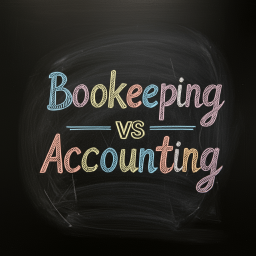Physical Address
304 North Cardinal St.
Dorchester Center, MA 02124
Physical Address
304 North Cardinal St.
Dorchester Center, MA 02124
Running a small business often involves juggling various responsibilities, and one area that leaves many owners scratching their heads is the distinction between bookkeeping and accounting. While they both play critical roles in managing finances, their functions, tools, and goals differ significantly. Let’s break it down to help you understand how each supports your business’s financial health and why they complement each other.

Bookkeeping is the process of recording daily financial transactions. It forms the foundation of a business’s financial system and ensures that every penny coming in and out is accounted for. Bookkeepers track invoices, receipts, and payments, maintaining a chronological record of financial activities.
Key responsibilities include:
Without accurate bookkeeping, you risk losing control of your finances and falling short of regulatory requirements. For a more in-depth explanation you can read “What is Bookkeeping?”
Accounting takes the raw financial data recorded by bookkeepers and turns it into actionable insights. Accountants analyze, summarize, and interpret financial information to help businesses make informed decisions.
Key responsibilities include:
Accounting provides the bigger picture of your business’s financial health and helps you plan for the future.

Proper bookkeeping lays the groundwork for effective accounting. Without accurate and up-to-date records, accountants can’t provide reliable insights or tax compliance. Bookkeepers ensure the financial data is clean and organized, while accountants turn that data into actionable strategies.

Yes! While some small businesses start with bookkeeping alone, as you grow, accounting becomes crucial. Think of bookkeeping as keeping your house in order and accounting as making long-term renovation plans. That’s the way it is supposed to be in theory.
In reality, some accountants also do bookkeeping at a lower rate than their financial analysis and tax advisory/compliance services. And I’ve known bookkeepers who were excellent at giving financial advice to their clients. It frequently happens, but it’s just not the norm.
Outsourcing can save time and resources:

For bookkeeping:
For accounting:
These are generalizations. The accountant tools listed can also handle bookkeeping, and the tools used by bookkeepers can produce financial reports.
In many cases, yes. A bookkeeper manages your daily financial transactions, while an accountant analyzes this data to provide strategic insights and ensure compliance with tax laws. However, just like as a you as a business owner have to wear many hats, we accountants do too! So, sometimes you’re lucky to find a person who do all three things.
Sometimes, especially in a small company. However, as your business grows, you’ll likely need specialized professionals for each role to handle the complexity. There’s another reason for this; something called “internal controls” and “segregation of duties” in accountant speak. That means for example, that the person writes the check and makes deposits should not be the same person who reconciles the bank account. Even if you’re a small business, it’s a good idea to segregate duties. I’m also saying it’s not good if the bookkeeper does everything. Yes people do sometimes get ripped off by their bookkeeper. I wish that didn’t happen, as I’d like to believe we’re all kind, kindred souls. But it happens perhaps even more frequently with bookkeepers than in other profession, since we got access to the moneybag.
Bookkeeping provides accurate records, while accounting interprets those records to inform decisions like pricing, budgeting, and investment opportunities. As we’ve said before, a bookkeeper can do these things as well, but then the bookkeeper is wearing their “accountant hat!” This is often the case in so-called “one man (or woman!) corporations” or “one-person business.” In this case, the owner doesn’t have to worry about being ripped off. Although that’s probably possible, too!
Bookkeepers: Use tools like QuickBooks, Wave, or Xero to manage transactions.
Accountants: Use advanced software like Sage or Oracle to analyze data and generate reports.